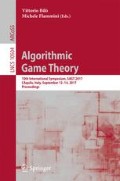Abstract
We study ordinal approximation algorithms for maximum-weight bipartite matchings. Such algorithms only know the ordinal preferences of the agents/nodes in the graph for their preferred matches, but must compete with fully omniscient algorithms which know the true numerical edge weights (utilities). Ordinal approximation is all about being able to produce good results with only limited information. Because of this, one important question is how much better the algorithms can be as the amount of information increases. To address this question for forming high-utility matchings between agents in \(\mathcal {X}\) and \(\mathcal {Y}\), we consider three ordinal information types: when we know the preference order of only nodes in \(\mathcal {X}\) for nodes in \(\mathcal {Y}\), when we know the preferences of both \(\mathcal {X}\) and \(\mathcal {Y}\), and when we know the total order of the edge weights in the entire graph, although not the weights themselves. We also consider settings where only the top preferences of the agents are known to us, instead of their full preference orderings. We design new ordinal approximation algorithms for each of these settings, and quantify how well such algorithms perform as the amount of information given to them increases.
This work was partially supported by NSF award CCF-1527497.
Notes
- 1.
Note that many of the papers mentioned here specifically attempt to form truthful algorithms. While RSD is certainly truthful, in this paper we attempt to quantify what can be done using ordinal information in the presence of latent numerical utilities, and leave questions of truthfulness to future work.
References
Abdulkadiroğlu, A., Sönmez, T.: Random serial dictatorship and the core from random endowments in house allocation problems. Econometrica 66(3), 689–701 (1998)
Abraham, D.J., Irving, R.W., Kavitha, T., Mehlhorn, K.: Popular matchings. SIAM J. Comput. 37(4), 1030–1045 (2007)
Anshelevich, E., Bhardwaj, O., Postl, J.: Approximating optimal social choice under metric preferences. In: AAAI (2015)
Anshelevich, E., Sekar, S.: Blind, greedy, and random: algorithms for matching and clustering using only ordinal information. In: AAAI (2016)
Anshelevich, E., Sekar, S.: Truthful mechanisms for matching and clustering in an ordinal world. In: Cai, Y., Vetta, A. (eds.) WINE 2016. LNCS, vol. 10123, pp. 265–278. Springer, Heidelberg (2016). doi:10.1007/978-3-662-54110-4_19
Bhalgat, A., Chakrabarty, D., Khanna, S.: Social welfare in one-sided matching markets without money. In: Goldberg, L.A., Jansen, K., Ravi, R., Rolim, J.D.P. (eds.) APPROX/RANDOM -2011. LNCS, vol. 6845, pp. 87–98. Springer, Heidelberg (2011). doi:10.1007/978-3-642-22935-0_8
Caragiannis, I., Filos-Ratsikas, A., Frederiksen, S.K.S., Hansen, K.A., Tan, Z.: Truthful facility assignment with resource augmentation: an exact analysis of serial dictatorship. In: Cai, Y., Vetta, A. (eds.) WINE 2016. LNCS, vol. 10123, pp. 236–250. Springer, Heidelberg (2016). doi:10.1007/978-3-662-54110-4_17
Chakrabarty, D., Swamy, C.: Welfare maximization and truthfulness in mechanism design with ordinal preferences. In: ITCS (2014)
Christodoulou, G., Filos-Ratsikas, A., Frederiksen, S.K.S., Goldberg, P.W., Zhang, J., Zhang, J.: Social welfare in one-sided matching mechanisms. In: Osman, N., Sierra, C. (eds.) AAMAS 2016. LNCS (LNAI), vol. 10002, pp. 30–50. Springer, Cham (2016). doi:10.1007/978-3-319-46882-2_3
Feldman, M., Fiat, A., Golomb, I.: On voting and facility location. In: EC (2016)
Filos-Ratsikas, A., Frederiksen, S.K.S., Zhang, J.: Social welfare in one-sided matchings: random priority and beyond. In: Lavi, R. (ed.) SAGT 2014. LNCS, vol. 8768, pp. 1–12. Springer, Heidelberg (2014). doi:10.1007/978-3-662-44803-8_1
Goel, A., Krishnaswamy, A.K., Munagala, K.: Metric distortion of social choice rules: lower bounds and fairness properties. In: EC (2017)
Kalyanasundaram, B., Pruhs, K.: On-line weighted matching. In: SODA, vol. 91, pp. 234–240 (1991)
Krysta, P., Manlove, D., Rastegari, B., Zhang, J.: Size versus truthfulness in the house allocation problem. In: EC (2014)
Rastegari, B., Condon, A., Immorlica, N., Leyton-Brown, K.: Two-sided matching with partial information. In: EC (2013)
Roth, A.E., Sotomayor, M.: Two-sided matching. Handb. Game Theory Econ. Appl. 1, 485–541 (1992)
Skowron, P., Elkind, E.: Social choice under metric preferences: scoring rules and STV. In: AAAI (2017)
Author information
Authors and Affiliations
Corresponding author
Editor information
Editors and Affiliations
Rights and permissions
Copyright information
© 2017 Springer International Publishing AG
About this paper
Cite this paper
Anshelevich, E., Zhu, W. (2017). Tradeoffs Between Information and Ordinal Approximation for Bipartite Matching. In: Bilò, V., Flammini, M. (eds) Algorithmic Game Theory. SAGT 2017. Lecture Notes in Computer Science(), vol 10504. Springer, Cham. https://doi.org/10.1007/978-3-319-66700-3_21
Download citation
DOI: https://doi.org/10.1007/978-3-319-66700-3_21
Published:
Publisher Name: Springer, Cham
Print ISBN: 978-3-319-66699-0
Online ISBN: 978-3-319-66700-3
eBook Packages: Computer ScienceComputer Science (R0)

